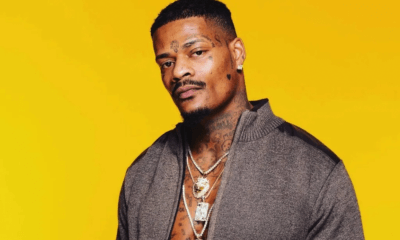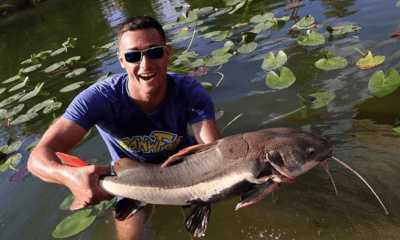Culture
Freddy Will’s “Quandaries of a Conqueror” is a Selective Trilogy of Books Coupled with Three Exclusive Album Releases!
Published
2 years agoon

The global Hip Hop community was blessed with a pioneering figure 26 years ago when African Black, also known as Freddy Will, set off on his journey in the summer of 1988. As a boy in Liberia, West Africa, the artist and author was captivated by the Kool Moe Dee song “Wild, Wild, West” that his neighbor played on his way home from school. Since then, Hip Hop became a vital part of his pursuits alongside theater and literary writing. His story is one of passion, courage, and creativity, inspiring people from around the globe.
Freddy Will, whose real name is Wilfred Kanu Jr., skyrocketed to fame as a renowned musician when he unleashed his album, “While I’m Still Young – The Talking Drums 1.2v,” along with its accompanying biographical book, “My Book of Chrymes,” on the bustling streets of Toronto, Canada. His signature songs, “City Boy” and “Providence,” featuring Carvin Winans, enchanted the public between 2008 and 2020. It was a testament to his genius, and his work has continued to resonate with people from all walks of life.
Today, the Grammy-nominated creative takes full advantage of Europe’s incredible opportunities for artists. The vibrant city of Berlin, with its generous support for creatives of all backgrounds, including non-EU citizens, has become home for Freddy Will, a proud New Jerseyan. He eagerly embraces his life as a freelance writer, hip-hop recording artist, and philanthropist—and publishes his inspiring “Notebook” online. Freddy’s hard work is a beacon of courage for many popular artists and creatives who follow in his footsteps.
“Right now, I’m determined to differentiate my art from the stereotypes of Gangsta rap, expanding my creative range. I have quickly realized that even in the European Union, breaking away from Hip Hop’s association with the Gangsta rap culture was hard. Berlin appeared like a paradise of creative freedom and artistic expression. I love the free culture, the live performances, and the themed parties. It’s becoming a conventional space where I explore options without fear of judgment or stereotyping. This is important to me.”

“On the S-Bahn, I’m stimulated with various cultural inspirations and eventually arrive at my lyrical chi. Canada gave me my start, and I’ll always be grateful. Now, I’m more encouraged. In Germany, despite the immense bureaucracy, I’m incredibly liberated. There is a way for artists to pay into a pension system that’s designed specifically for us. That’s a great support system because artists have something to fall back on when we talk about tangible results outside of mainstream superstardom,” he says with conviction.
The freelance author fervently refers to the professionals, and freelancers working within Europe’s Schengen zone. Freddy activated the European part of his journey as a thoughtful freelancer, which he has upgraded to an ambitious entrepreneur. The importance of his new book trilogy is immense for him. He is in an ideal place at the optimum moment and doing it legitimately. The author is enthused to be productive as a creator, devoted to crafting original and organic literary and musical works that enthrall and move the spectators.
Freddy Will said he wants to accompany his ambitious book trilogy, Quandaries of a Conqueror, with spellbinding music releases to intrigue the fans in the near future. He intends for his promotional singles to blend with adventurous crossovers that contain mesmerizing melodies, thumping drums, and vivid lyrics. He will be working with the wildly talented and enigmatic violinist Lilly V, who captivates audiences with her soul-stirring symphonies as she marches towards the release of her debut classical album.
Lilly V’s passionate violin bow strokes and profound knowledge of classical music enrapture fans with a masterful display of brilliant artistry. Her musicality is unparalleled, evoking powerful emotions—from awe and admiration to sadness and joy. Lilly V plans to revolutionize the future music scene collaboratively by blending her sound with afrobeat, neo-soul, and salsa. Her debut album promises to be an aural masterpiece. She joins Freddy Will as they both expect to take their artistic expression to new heights.
Will Freddy face obstacles or naysayers when introducing his vivid imagination in the artistic realm of today’s polarized soundscape? He revealed his tireless passion to improve his craft, which drove him to be one of the first to experiment with some fascinating calypso, zouk, afrobeat, and hip-hop crossovers from his 2008 “City Boy” to 2020’s African Black album. His enthusiasm is undeniable, igniting powerful emotion and transporting listeners with multifaceted productions and mainstream epic storytelling.
The Sierra Leonean-American passionately declared, “I don’t want to give a false understanding of the indie music scene in Europe. It’s not a stroll in the park! Sure, they promote diversity and cultural inclusion, but the language barrier remains, even after I’ve taken numerous German and French courses. This means I’m still dependent on British and North American audiences. More than half the Germans request a version of my book or song in their language. I’m determined to overcome this obstacle, but it takes work!”
The varied languages of Western Europe, Scandinavia, and the Baltic region are dazzling jewels, each possessing an individual beauty. Despite the progress that Europe has made towards tackling racism, you may acutely sense that more needs to be done. There may no longer be bullets fired at blacks. Still, the insidious effects of prejudice may remain forever out of reach because of race. The many European friends, partnerships, and lovers may never occur because of skin color. The need to fight racism is urgent and ongoing
Freddy Will’s eyes widen as he takes in the plight of immigrants and migrants from countries of Arab or African ethnicity. His heart sinks at the understanding of the harsh reality the asylum seekers are facing in Europe. Europe’s “genetic suicide culture” is also driven by a radical mindset unlike anything before. The alluring and attractive are content to remain single and childless, indulging in the free-sex culture while men “cockblock openly.” Freddy is horrified by the prevalence of it all and hopes for a better future.
We have noted that since his 2014 epic Hip Hop Kruzade: Path of a Legend and Laboramus Exspectantes Vol. 1 book and album in Canada, he has released a monumental Greatest Hits album, Views from the 7, in Belgium in 2017, and African Black: The Unreleased Anthems and Ballads in Germany in 2020. Both albums came with an electrifying selection of new songs. At the same time, he published the seven-volume book series The Sandmann’s Journal between 2016 and 2023. His thrilling storytelling has stirred many emotions.

The Sandmann book series he unleashed chronicles the seismic shift digital technologies such as smartphones, WIFI, social media, and the Internet have had on global culture, changing the dynamics of male-female relationships, civil rights, and traditional African cultures. The books are written in a character-rich voice that invokes multiple senses, creating intriguing and complex conversations. This series evokes strong emotions as the author navigates writing and publishing them from Canada, the US, Belgium, and Germany.
In 2023, Freddy Will rebranded his company and formed an association in Oxford, UK, to distribute the ultimate versions of his initial three books and The Sandmann’s Journal. Songs on his upcoming musical releases discuss present encounters in his freelance profession. Some of our talks revolved around conspiracy theories about obscure web trolls erasing his online magazine articles with bots and web crawlers, diminishing perspectives on his YouTube channel, and withdrawing devotees from his social media profiles.
“They don’t want the public to see how successful and impactful my work is.” The new book series is about geopolitics, cultural relations, and the role he believes Africa will play in the future of climate change and renewable energy. The accompanying music is a visionary collaboration, comprising little-known singers in the ensembles and hip-hop, primarily composed of the boom-bap beat and Freddy’s rap. Some of our favorites that he played were swaggering party to dark, politically conscious raps to some radio-ready songs.
The yet-to-be-named collaborative singers on the upcoming new music emphatically support the rapper as he passionately raps about his electrifyingly unique experiences, extraordinary economic success, vibrant cultural passions, creative artistry, and sultry sexual or romantic fantasies. The project begins with “haters” he claims are responsible for maliciously removing his third-party-based promotions from the Internet and their obsessive fixation on obstructing his interests to the point of unprecedented desperation.
He said, “These people are violating numerous international laws to hack my devices and track my movements and sabotage my meteoric rise and widely known interests.” The freelance entrepreneur boasts of the Theater for Literature and Performing Arts. He is touring while republishing his catalog with his new partners in the UK. Freddy Will moved to Toronto, Canada, when independent hip-hop showed promise there. The scene was fruitful for launching indie music and blogging. That environment allowed him to start.
We fervently believe Freddy Will has a remarkable career worthy of recognition. His music and books are extraordinary, his ideas are innovative, and he has an ambitious dream. On the other hand, Berlin, Germany, is a city bustling with a dynamic techno scene and a population of unique, outspoken, and eccentric characters. The underground hip-hop and afrobeat nightclubs of the former warehouses, crematoria, and squatter housing come alive with an energy that is contagious and fascinating. Freddy has already done a lot here.
“Listen, do you know that I can’t even begin to express the intricacies of my work for fear of someone stealing the idea and replicating it before I can finish the project? From the bustling subway and sidewalk musicians playing pop, classical, and opera tunes in Europe to Germany’s progressive atmosphere for authors and artists, my musical and literary network in Africa, Canada, the United Kingdom, Germany, and the United States is set to create a resonance throughout the global independent and freelance scenes.”
Quandaries of a Conqueror is sure to make a powerful impact!
Website: www.freddywill.com
Instagram: @6th_saturnus_freddy
X: @freddywill
This article contains branded content provided by a third party. The views expressed in this article are solely those of the content creator or sponsor and do not necessarily reflect the opinions or editorial stance of Popular Hustle.

You may like
-


Milovay Is Done Starting Over and Just Getting Started
-


Andre Correa’s New Single “Histórias” Explores How Stories Change in the Telling
-


Miixed Realities Proves Medical Billing Doesn’t Have to Be a Black Hole
-


GMDCASH Talks Comebacks, Jail Time, and Why He’s Just Getting Started
-


Meet Lil Deezull, the Cambridge Rapper Finding His Moment
-


Dennis Dewall Reboards the Spy Genre with International Thriller ‘THE TRAIN’
Business
HundRoses Is Building a Dating App Where You Can’t Message Anyone Without Proving You’re Real
Published
4 months agoon
October 30, 2025
Online dating has a trust problem. You match with someone, start a conversation, and three messages in you’re wondering if you’re talking to the person in the photos or someone running a script from a call center overseas. Fake profiles, catfishing, bots posing as humans. It’s exhausting. HundRoses, a dating platform in development for Canadian and American users, has a straightforward solution: make people prove they’re real before they can send a single message.
Here’s how it works. You can browse profiles without any verification, scroll through potential matches, and get a feel for the app. But the moment you want to actually talk to someone, verification is required. It’s a hard line that most dating apps won’t draw, but HundRoses is prioritizing safety over convenience.
The verification requirement only for messaging is smarter than forcing everyone through it upfront. People want to explore before committing, and there’s no point making someone verify their ID just to see if the app even has users in their area. But once you’re interested enough to reach out, proving your identity becomes part of the process. It’s the difference between casual browsing and genuine engagement.

This approach directly addresses what makes online dating feel unsafe for a lot of people. Women deal with harassment, fake accounts, and people who aren’t who they claim to be. Men waste time talking to bots or scammers. Everyone’s been ghosted by someone who was probably never real in the first place. Verification raises the floor. If someone has to verify their identity to message you, you know there’s an actual human on the other end. That baseline level of accountability changes how people interact from the first conversation.
The platform calls itself a dating app “built around respect and trust,” and the verification system backs that up. It’s not just a tagline or marketing language. It’s baked into how the app functions at its core. You can’t operate anonymously when it comes to making connections, which changes the dynamic from the start. There’s a real person behind every message, and both people know it.
HundRoses is launching in Canada and the USA, targeting North American singles who are tired of the same recycled experiences from Match Corporation’s family of apps. They’re currently offering early access to VIP members while the platform’s still in development, building a user base that values verified connections over anonymous browsing. The focus on Canadian and American markets gives them a contained launch to refine the experience before considering expansion.
The verification barrier separates people who are serious about meeting someone from those who just want to browse without accountability. For users fed up with fake profiles and dead-end conversations, that barrier is exactly the point. It filters out the noise before it even starts.
Dating apps have spent years trying to make everything as frictionless as possible, removing any obstacle between swiping and messaging. HundRoses is adding friction back in, but only where it matters. Browse all you want, but if you’re going to reach out to another person, you’re doing it as yourself.
Learn more at HundRoses.com or follow their development on Instagram, Facebook, X, and LinkedIn.
Culture
Composer Wang Gang Bridges Cultures with “Memory of Xinjiang”
Published
9 months agoon
June 12, 2025
There’s something captivating about how Wang Gang approaches traditional music—he doesn’t just preserve it, he breathes new life into it. His latest composition, “Memory of Xinjiang,” continues this approach, building on the success of “Spring Rain” from his Eastern Journey series, which earned a Global Music Award.
Wang’s new composition draws from the folk song “Our Wonderful Xinjiang,” and here’s what’s fascinating—he preserves its traditional rhythms and modal structures while incorporating modern electronic elements. The result creates an auditory experience that honestly feels like traveling across Xinjiang’s diverse geography. You can almost see the Nalati Grassland stretching endlessly, feel the imposing presence of the Tianshan mountains, and sense the shifting sands of the Kumtag Desert.

Wang acknowledges that we’re living in an era dominated by short videos and the pursuit of online traffic, yet he firmly believes in pure music’s power to anchor listener attention. His goal is transforming simple auditory perception into what he describes as a multidimensional musical experience that evokes profound emotional resonance.
What’s interesting is how Wang’s approach reflects broader changes happening in Chinese folk music. As globalization and digital technology reshape how music gets made and shared, traditional sounds are finding fresh expressions through cross-cultural partnerships and technological innovation. It’s not just about preserving the past anymore—it’s about making it relevant for today.

For “Memory of Xinjiang,” Wang assembled an international team of musicians working across borders—no small feat in today’s world. The collaboration includes violinist Zhang Yi, cellist Yu Ping, Guzheng artist He Ying, and Pipa artist Zhou Yating from China, alongside vocalist Li Sisi. Producer Mei Zi worked with Canada’s Osmanthus Music Studio for recording and mixing, proving that great music doesn’t recognize geographical boundaries.
What’s particularly striking about the piece is how it weaves together instruments from different traditions. Traditional Xinjiang and Central Asian instruments like the Sitar, Daf drum, Rawap, and Tambur blend seamlessly with digital synthesis and modern production techniques. This isn’t just musical fusion for its own sake—Wang genuinely sees it as the future of composition and music distribution. The efficiency and creative flexibility this approach offers has clearly impressed him, and honestly, the results speak for themselves.

The project reunites Wang with executive producer Fei Yun, a Chinese Canadian musician who’s built quite a reputation for curating original compositions that highlight Chinese folk elements. Her track record is impressive—previous projects include acclaimed works like “Drum Zen,” “Spring Rain,” and “The Song of the Drums” series, which have earned recognition at international art competitions. What makes her particularly valuable isn’t just her artistic insight, but her practical experience in bringing Chinese music to global audiences without losing its authenticity.
Fei Yun’s background as an independent producer gives her a unique perspective on how traditional elements can resonate with contemporary listeners worldwide. She understands both the creative and business sides of music, which is increasingly important in today’s industry. Her involvement brings a level of credibility that matters when you’re trying to bridge cultural gaps through music.
Wang’s work sits at a really interesting intersection. He’s deeply rooted in traditional Chinese culture but equally engaged with contemporary aesthetics and technology. Whether through remote collaboration or the fusion of digital and multimedia art, he’s constantly pushing boundaries while respecting the source material—a balance that’s harder to achieve than it sounds.

The composer’s range is genuinely impressive, spanning from the delicate melodies of Jiangnan Tanci to the complex rhythms of Xinjiang’s Maqam musical tradition. His ability to move between classical instruments and electronic textures speaks to a broader evolution in how Chinese music engages with the world. It’s not about choosing sides between old and new—it’s about finding ways to make them work together.
“Memory of Xinjiang” represents more than just musical innovation—it’s part of a growing movement where traditional music doesn’t simply preserve the past but actively engages with the present. Through collaborations that cross continents and genres that blend centuries of musical development, Wang is helping Chinese music find its rightful place on the global stage.
The success of projects like this suggests that audiences are genuinely hungry for music that honors tradition while speaking in contemporary terms. As technology continues to reshape how music gets created and distributed, composers like Wang are proving that cultural authenticity and modern innovation don’t have to be opposing forces. In fact, when done thoughtfully, they can enhance each other in ways that create something entirely new yet deeply familiar.
There’s something hopeful about this approach to music-making. In an era where cultural divisions often make headlines, Wang’s work demonstrates how artistic collaboration can build bridges between different worlds, creating shared experiences that transcend geographical and cultural boundaries.

Emily Pratt Slatin is not someone who speaks in half-measures. A former firefighter and paramedic lieutenant, passionate photographer, and candid writer, Slatin has built a life defined by authenticity and resilience. Through her personal blog RescueGirl557, she shares her experiences with unflinching honesty—from the challenges of an unconventional upbringing to finding peace on her Vermont farm. We recently had the opportunity to speak with Slatin about her journey, her values, and what drives her unwavering commitment to living truthfully.
The Conversation
You’ve written extensively about your early life and identity struggles. How would you describe those formative years?
I was born intersex with XX chromosomes and unmistakably female anatomy aside from one trait. From the beginning, my identity was a battleground. My family refused to accept me as their daughter, even trying to legally change the name “Emily” that nurses had written on my birth chart. But I knew who I was—I was Emily when I looked in the mirror, when I introduced myself to strangers. At 16, doctors clinically confirmed what I’d always known: I was genetically female. That sparked what my family called an “intervention,” which was really more of a tribunal where they condemned who I was. That was the moment I walked away and lost my biological family. But they were never really mine to begin with, and their absence hurt less than their expectations.
After that separation from your family, how did you build your life?
By 16, I was working at a summer camp where I’d grown up, and by 18, I had earned my EMT certification and joined a local fire department. I made a name for myself—Emily, Rescue Girl, the one who didn’t flinch, the one who stayed standing. For over two decades, I worked in emergency services, eventually becoming a Firefighter and Paramedic Lieutenant-Specialist. I led crews, taught trainees, and saved lives, all without the support or approval of the family who had cast me out. But witnessing tragedies that no human being should ever have to see takes its toll. Eventually, I chose to walk away from that career—not because I couldn’t handle it anymore, but because some chapters don’t need closure. They just need to end.
Your blog reflects an extraordinary commitment to honesty. Why is authenticity so important to you?
I’ve been told I’m too much, too intense, too much of an over-sharer, and too honest—I take every one of those labels as a compliment. I don’t do small talk or sugarcoat hard truths. On my blog, I share the most painful chapters of my life not for shock value or pity, but because truth doesn’t care if it makes people uncomfortable. I refuse to shrink myself to make others feel comfortable. My loyalty lies with the truth, no matter how harsh. I believe you either speak the truth or you’re lying—there’s no in-between. This moral stance is a throughline in my worldview. After spending so much of my early life having others try to control my narrative, living authentically is non-negotiable.
After leaving emergency services, you turned to homesteading. What does that lifestyle represent for you?
I bought a modest ranch house on 10 acres of Vermont farmland, seeking grit, utility, and freedom over comfort. I wake up every morning in a house I wired, on land I protect, with things I built from scratch. Every square inch of this life is mine. There are no name corrections needed on this property. After a lifetime of others trying to control my narrative, I’ve literally constructed a space where I answer to no one’s expectations but my own. I refuse to pay people to do what I can do myself with my own two hands. The coffee tastes stronger when you’ve earned your peace with blistered hands. The sun feels warmer when you no longer hide your skin.
Your writing often references “ghosts” and “storms.” What do these metaphors represent in your life?
The ghosts are the impressions of memory, loss, and former selves—the child I never got to be, the friends and family who faded from my life, even the person I was before trauma reshaped me. They follow us quietly, in the spaces between chaos and calm. The storm represents my emotional intensity—my rage, passion, pain, and power all at once. I used to see this intensity as a problem, but I’ve come to claim it: I am the storm, the woman who cannot be contained. And I would not change a damn thing. These aren’t just metaphors—they’re how I make sense of the chaos I’ve survived, how I process my emotional life and find meaning in everything I’ve endured.
You’ve written movingly about finding love with your wife, Amelia. What does that relationship mean to you?
With Amelia, love was not struggle or sacrifice; it was as easy, and as necessary, as breathing. She saw me as a person in a way that hit harder than I was willing to admit, because I had grown used to being overlooked or misunderstood. When she came out as transgender, I knew I loved her with a certainty that does not shake loose in the dark. Both of us faced family rejection for our love—the day I married Amelia was the day I lost what little connection I had left with my own family. Instead of letting this dual abandonment embitter us, we stood closer. We stitched a new family out of the thin air around us, made stronger precisely because it was chosen, not assigned. In the silence they left behind, we found something better than acceptance—we found belonging.
Beyond your personal journey, you’re also a creative person—a writer, photographer. How do these creative outlets shape your life?
Writing has been my lifeline—prose is what kept me alive on dark nights. I had the opportunity to be mentored by Beat poet Allen Ginsberg in my youth, which shaped my literary perspective. Photography allows me to tell visual stories, capturing moments and places with the same honesty I bring to my writing. I’m not built for mediocrity; I don’t fear obsession, I embrace it. Anything worth doing deserves my full force, my entire intellect, and my unwavering focus. That’s how I approach everything, from fixing a tractor to composing the perfect shot. Mastery, to me, is a form of both personal discipline and self-expression.
After everything you’ve been through, what values guide your life now?
Authenticity is my North Star—I’ve never relinquished my right to define myself. Courage and resilience are second nature to me; sometimes bravery is quiet and stubborn, reaching for something better even if your hands are shaking when you do it. Compassion runs deep—ironically, the very girl whom my parents called selfish and wrong grew up to devote decades to rescuing strangers and caring for a child who wasn’t legally mine. And integrity infuses everything—I simply will not live a lie. I will speak up, even if my voice shakes. I will cut ties, even if my heart aches. I will stand in my own skin, unashamed and unafraid.
Finding Truth in Resilience
Emily Pratt Slatin’s story is ultimately one of hope—hope in finding love that accepts you fully, hope in creating family and community from scratch, hope in the simple healing found in nature and honest work. After facing rejection, trauma, and loss, she has transformed pain into strength and isolation into self-sufficiency.
“I didn’t need happy,” she reflects. “I needed honest. And that is exactly what I finally have.”
That hard-won honesty is the compass by which Slatin steers her life. It makes her voice powerful and her presence authentic—a testament to a woman who chose to live truthfully, love deeply, and never let others define her fate.



Milovay Is Done Starting Over and Just Getting Started

Andre Correa’s New Single “Histórias” Explores How Stories Change in the Telling

Miixed Realities Proves Medical Billing Doesn’t Have to Be a Black Hole

GMDCASH Talks Comebacks, Jail Time, and Why He’s Just Getting Started

Meet Lil Deezull, the Cambridge Rapper Finding His Moment

Dennis Dewall Reboards the Spy Genre with International Thriller ‘THE TRAIN’

Saynt Ego on Grief, Mental Health, and Learning to Sit With the Noise

Marloma Talks Learning to Stop Writing in Isolation and Trust the Chaos

Zizzo World Is Building Momentum That’s Hard to Ignore

Yash Kapoor Wants His Records To Feel Like Moments, Not Just Music

Inside the Amazon Reinstatement Process: The aSellingSecrets Approach

Golden Bay Beach Hotel — A Luxury Beachfront Escape in Larnaca, Cyprus

Nodust Writes His Lyrics Last and That’s Exactly the Point

Finding Strength in Walking Away Is the Real Message Behind Judy Pearson’s New Single

Joaquina’s “Freno” Captures the Push and Pull of Letting Go

Jason Luv Dominates Charts While Inspiring New Wave of Multi Career Artists

Harley West | Inside the Mind of a Social Media Star on the Rise

Raw Fishing | Franklin Seeber, Known As “Raww Fishing” Youtuber Story

Jordana Lajoie Transforms Montreal Roots into Hollywood Success Story

A New Hollywood Icon Emerges in Madelyn Cline

Who is Isaiah Silva – The Story Behind The Music

Tefi Valenzuela Pours Her Heart into New Song About Breaking Free

G FACE Releases His New Single “All up,” and It’s Fire

Gearshift to Stardom: Nikhael Neil’s Revolutionary Journey in the Automotive Industry

Kaia Ra | Perseverance That Built a Best-Selling Author

Holly Valentine | Social Media Influencer & Star Success Story

Kate Katzman | Breaking Into Hollywood and Embracing Change

Thara Prashad | Singer Evolves to Yoga & Mediation Superstar

Tadgh Walsh – How This Young Entrepreneur is Making a Name for Himself

King Lil G | West Coast Hip Hop Genius Rises to Face With Ease

Tefi Valenzuela Pours Her Heart into New Song About Breaking Free

Kate Katzman | Breaking Into Hollywood and Embracing Change

Holly Valentine | Social Media Influencer & Star Success Story

Kaia Ra | Perseverance That Built a Best-Selling Author

Lil Ugly Baby XXX’s “Who?” – The Mixtape to Boost Your Playlist

Samuel Chewning Explains How Fitness Should Be A Personal Journey

Trending
-

 Business4 years ago
Business4 years agoJason Luv Dominates Charts While Inspiring New Wave of Multi Career Artists
-

 Entertainment3 years ago
Entertainment3 years agoHarley West | Inside the Mind of a Social Media Star on the Rise
-

 Culture4 years ago
Culture4 years agoRaw Fishing | Franklin Seeber, Known As “Raww Fishing” Youtuber Story
-

 Culture3 years ago
Culture3 years agoJordana Lajoie Transforms Montreal Roots into Hollywood Success Story
-

 Culture2 years ago
Culture2 years agoA New Hollywood Icon Emerges in Madelyn Cline
-

 Entertainment1 year ago
Entertainment1 year agoWho is Isaiah Silva – The Story Behind The Music
-

 Entertainment3 years ago
Entertainment3 years agoTefi Valenzuela Pours Her Heart into New Song About Breaking Free
-

 Culture4 years ago
Culture4 years agoG FACE Releases His New Single “All up,” and It’s Fire

